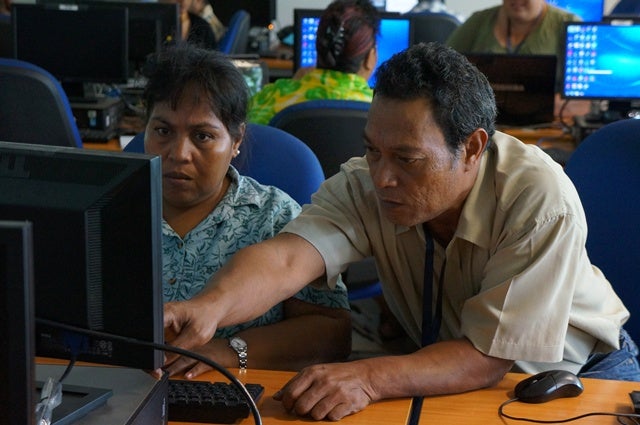THERE is something that I have not really discussed here perhaps because it can become rather technical and cumbersome for some but it is one of the cornerstones of our, the United Nations Population Fund, existence and that is population data for development.
Story's in the data

Such data is imperative for inclusive decision-making from a personal level (the pass rate of a secondary school may influence one's decision to attend it) to a policy level (rates of violence against women require continued investment in both human and monetary resources).
Evidence-based interventions are very simply put, logical. There is the added satisfaction that one is not acting blindly so to speak. Chapter XII of the International Conference on Population and Development (ICPD) Program of Action, the UNFPA bible if you will, highlights the importance of valid, reliable, timely, culturally-relevant and internationally-comparable data for policy and program development, implementation, monitoring and evaluation.
Here at home, if you have accurate up-to-date data on a certain area then you as a user of the data can for example make presentations to the appropriate government institution for a new service like a primary school.
With evidence of the population dynamics, perhaps because an increasing number of people have moved into your neighborhood in search of more prosperous livelihoods, the government would perhaps then make budgetary allowance for a school.
It is a mutually-beneficial relationship - the community's right to an essential service and the child's basic human right to education are both met and for the government, it's fulfilled its obligations to the people and the international instruments it has ratified, like the Millennium Development Goal 2 which is the aim to "achieve universal primary education".
Globally, the demand for data is increasing as a result of greater accountability for development outcomes, as well as greater number of people. Data does not only help you make decisions but for development agencies like us, data enables us to measure "performance" for example how much progress the countries we work with are making as far as achieving the goals of the afore-mentioned ICPD program of action or the MDGs are concerned - and from that point, we can then know how much more needs to be done or the exact approaches that need to be strengthened.
In short, for all UN agencies, data is essential for accountability particularly as it relates to funding and management; the UNFPA is one of the global actors guiding the use of data to achieve such goals and within UNFPA, data is needed for evidence-based policy, program design and implementation, and advocacy.
Population data is also critical when we talk about social and economic research: data in this context will assist both of us to understand how development (specific) interventions affect development outcomes while taking into account the views of the intended beneficiaries - women, adolescents, etc.
At the end of last year (2012), UNFPA hosted regional participants from several countries including Fiji, Samoa, Papua New Guinea and Kiribati for a workshop we organised with the Latin American and Caribbean Demographic Centre (CELADE). The training involved the introduction of REDATAM (retrieval of data for small areas by microcomputer) into their national statistics systems.
The technical explanation would bore you but in essence, it is a census data dissemination software that allows anyone to access census data online. The exact data from surveys or census uploaded online will be at the prerogative of the national statistics office while duly ensuring confidentiality but as a data user, you can create any kind of cross-tabulation, at any geographical level with this software.
So if census or survey data has been uploaded from your village or province for example, all you would need to do is add your variables and the software gives your tabulations immediately.
This software means statistics office staff can then dedicate their time on other outputs. Having the data online can also be so much more meaningful for researchers, for students, etc and economical for both parties - the statistics office does not print reports which are not used and people just extract what they need as opposed to requesting and printing tabulations that they may not use at all.
REDATAM addresses all concerns that statistical offices may have with regards to confidentiality of data and allows data users to generate custom outputs which they themselves can define. Its webserver application further facilitates user access to the data via internet. To date, Vanuatu is the only country in the region that has uploaded its census data using REDATAM.
If more Pacific islands used REDATAM to upload their survey or census data, we may also begin to see more Pacific representation on global reports because our data are available and comparable.
Workshop participants I spoke to were quite eager to return home to introduce REDATAM to their systems. Fiji participant Semi Talemaivavalagi encapsulated their feedback when he said "Numbers, they tell a big story which is very much useful in today's development", in recognition of the critical role statisticians play in effective (development) planning.
Another UNFPA favourite is "disaggregated" data - this is the need to provide details like gender, age, salary, etc, so one gets a fuller picture of a population and its needs. For us, the collation and analysis of disaggregated data is, among other reasons, to enable a clearer picture of "marginalised" or "excluded" groups so intervention can be targeted.
Pacific governments have made considerable progress in data collection and analysis; it is the dissemination of this data that we are now working with national statistics offices and health ministries.
In fact, considering our geographical and infrastructural challenges, we are very encouraged with the regional progress: having one Pacific country among global REDATAM users is indeed a milestone worth celebrating.
I am sure you will agree with me that we should work harder at achieving a region that has world-standard data collection, analysis and dissemination systems for this is imperative to the improvement of the lives of our people.



